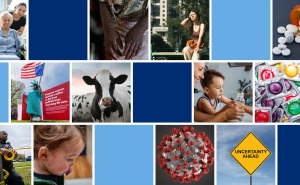JHU Center for Global Women’s Health & Gender Equity GE/GBV Accelerator Fellows at SVRI ’24 Forum

GE/GBV Evidence Accelerator Scholars with JHU faculty mentors
Johns Hopkins Center for Global Women’s Heath & Gender Equity (CGWHGE) was pleased to support its inaugural cohort of Gender Equity/GBV Evidence Accelerator Fellowship scholars as they participated in the 2024 Sexual Violence Research Initiative (SVRI) Forum in Cape Town, South Africa, in October.
The Gender Equity/GBV Evidence Accelerator Fellowship Program, launched in February 2024, offers sponsored mentorship and select coursework at the University to practitioners, professionals, and scholars engaged in gender equity work, including those focused on gender-based violence (GBV), particularly in low- and middle-income settings.
Over the course of the yearlong fellowship, in a cohort experience designed for networking and professional development, scholars complete a mini-project focused on gender equity/GBV, such as secondary analysis of survey data, or evidence synthesis, with ongoing mentorship and data analysis support from CGWHGE faculty. Scholars also convene for in-person cohort gatherings. This year, that gathering was organized around the SVRI ’24 Forum in Cape Town, South Africa, from October 21 to 25. Along with attending Forum events and among a series of in-person activities planned by the CGWHGE, the inaugural cohort of scholars presented their mini-projects to JHU faculty mentors during a half-day, work-in-progress workshop.

Lorato Modongo, GE/GBV Evidence Accelerator Scholar’s presentation
The research topics span the life course. The work of Omera Naseer, MBBS, FCPS, focused on the gendered experience of childhood vaccination. Ayodeji Matthew Adebayo, MPH, MBBS, FWACP, explored regional-level risk factors of intimate partner violence among adolescent girls and younger women. Abigail Mwende Malelu, MA, investigated intimate partner violence help-seeking and professional status among adult women. The scholars’ research also touched on topics relevant to women’s reproductive life course. Mobolaji Modinat Salawu, MBBS, FWACP, looked at the association between induced abortion and intimate partner violence, and Sunu Thomas, MD, explored the relationship between childlessness and intimate partner violence.
Mini-projects covered emergent and understudied areas of research, such as Nada Zeineb Ben Jemaa’s work on technology-facilitated gender-based violence, the examination by Suresh Jungari, PhD, MPS, of digital empowerment, and Tein Wan, MS’s research on intimate partner violence and disability status in a conflict setting.
The projects of the inaugural scholar cohort highlighted pivotal areas of potential intervention across different spheres of people’s lives. Lusine Aslanyan, MPH’s work explored awareness of violence support services at the individual level, while Tricia Basdeo-Gobin, MS, proposed norms change activities at the individual and community levels given norms’ association with men’s violence perpetration. Lorato Palesa Modongo, MA, and Helen Akenyemi, MSc, both examined improved gender-based violence policies at the national level. The collective research efforts of the scholars spanned nine countries and generated thoughtful, site-specific recommendations.

Mobolaji Salawu, GE/GBV Evidence Accelerator Scholar’s presentation
The scholars are currently working on refining their research and findings to create data briefs for disseminations in their respective countries to convert this evidence to action.
Follow the continued work of the Gender Equity/GBV Evidence Accelerator Fellowship scholars via the Center for Global Women’s Heath & Gender Equity (CGWHGE) website or joining the Center’s mailing list.



